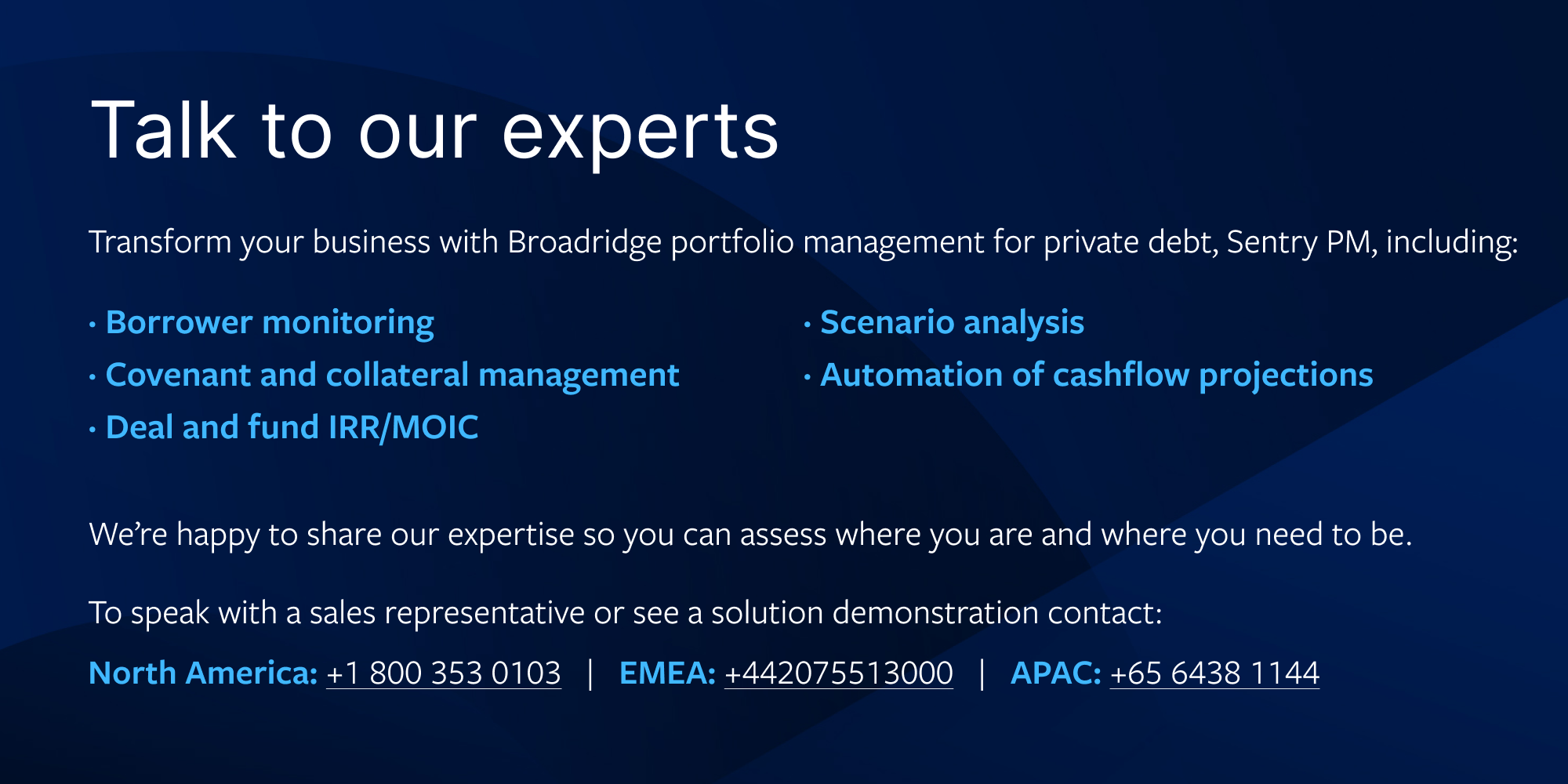The Impact of Private Markets and Outsourcing on Operational Excellence
Scott Turley podcast interview with Cutter Associates.
Video Transcript
Michael: Hello everyone. And welcome to our next session here today. Very glad you guys are all joining us. Following up on our theme here, our day one theme of achieving operational excellence, we thought it'd be great to follow up the last session on future-proofing your business, with another session that we're gonna focus on the impact of private markets and outsourcing on operational excellence. My name is Michael Conn. I'm on our business development team here at Cutter and I'm very happy to be joined here today by Scott Turley. So, Scott is the head of product evolution in the Broadridge Asset Management Solutions division. So welcome, Scott.
Scott: Thank you. Thanks for having me.
Michael: So, Scott I guess just in the way of introductions, could you just give us a brief introduction about yourself and your remit within the organization?
Scott: Certainly. I've been in the financial services area for a couple of decades. Ran a technology company that produced the product called Sentry for ClearStructure. Joined Broadridge at the acquisition of ClearStructure back in November of 2019. And since I've been involved with helping manage the product strategy within the Broadridge Asset Management Solutions division.
Michael: Great, great. And that's across all products or focused on a particular area?
Scott: That's across all of our main product stacks, which encompass front to back office, portfolio management solutions for, you know, equities, bonds, private debt, private equity, and other asset solutions in fee billing and expense management. So, pretty much runs the gamut of front-to-back office technology that we provide.
Michael: Great, great. Well, very pleased to have you join us here today and definitely looking forward to hearing some of your insights, you know, especially as it comes to, you know, your view from sitting at Broadridge and more generally around the markets in general. And I guess, you know, one of the things that we'd be interested in hearing about at least at the outset are about those trends. You know, what are you seeing within the traditional buy-side asset management are our core footprint. The folks that are joining us here today. And what are some of those trends that you're noticing at Broadridge today?
Scott: Well, we've definitely seen a lot of allocation going to the private markets, both in private debt and private equity in which we're involved. So, we're seeing a lot of large institutional investors increasing their allocations. That means that that asset class is growing very quickly. And with that growth comes a lot of technical challenges and operational challenges. So, we're seeing a lot of interest in the marketplace in finding the right solution. So, how do we manage the unique nature of these types of investments and their unique challenges at the same time, being able to scale and to provide, you know, end-to-end solutions to the clients? So, we're seeing a lot of growth and a lot of change and, you know, a lot of opportunity.
Michael: And have you noticed a movement towards service providers or are you still seeing folks, you know, purchasing bespoke software, installing, hosting themselves?
Scott: We're definitely seeing a lot of outsourcing. We're seeing managers who are looking to focus on what really drives their business forward, which is, you know, Alpha being able to manage and select and make their investments to the best of their ability. So, we're seeing a lot of managers who are looking to outsource and when it comes to outsourcing, there's a lot of challenges there. And why is outsourcing such a popular and I think such a strategic move? I think there's three or four things. One is, you know, take private debt, for example. They're non-standardized, so it's any agreement that can be struck between a lender and a borrower. So that means operational complexity, and they have to deal with that. Also, there's a lot of activity from the front to back office in the private markets where there's a lot of reporting, a lot of notifications that need to happen, a lot of reconciliations.
And that usually means investing in multiple systems, which means you have to integrate them and manage them. And along with that comes, you know, training and maintaining staff. For larger managers, maybe not quite as challenging, but for smaller managers, you know, having staff in a redundant way that can cover, you know, vacations and changes of, you know, people who leave and come and go, it becomes very difficult. And then as you try to scale at the same time, it's, you know, it's probably no wonder that managers are looking to outsource that so they can focus on, you know, their investments. And we're seeing that trend, you know, grow dramatically, I'd say over the last couple of years.
Michael: Yeah. I would echo the same. And when it comes to Cutter and the type of advisory work that we get involved in that's definitely...we see the same trend what used to be sort of the build versus buy decision is very much now buy versus outsource or procure services. And certainly, the same trend around consolidations of vendors and offloading functions that folks see as being non-critical that are somewhat commoditized functions within the organization. If there's the ability to offload that to somebody who has the scale and the ability to support the business, that seems to align really well with what we're seeing out there as well. So I guess when it comes to Broadridge, and you say that you have a BPO service. For those who are unfamiliar, you know, what does a BPO service entail from Broadridge? You know, what do clients wanna spend on?
Scott: Well, they wanna spend on basically outsourcing some of that operational work that they need to do. So, an asset servicing for loans, for example. So using business process outsourcing or BPO from Broadridge, they can basically focus on origination and evaluating their loans and then let the outsourcing team handle the daily cash flows, the reconciliations with the bank accounts, notifying the borrowers and the lenders of upcoming payments and invoices. And there's a lot of operational work that has to go around lending in particular. And so they can outsource that and then what it basically boils down to is then getting the data back. So, you know, if you outsource, that's great, so now you have somebody managing your operations, but there's a lot of data that you want from that outsourcing. So you wanna analyze the cash flow, you wanna calculate IRS and multiples of invested capital.
So, choosing an outsourcing provider that can give you that data back in a way you can easily consume it and analyze it is also, I think something that clients are looking for. So it's not just, you know, the nuts and bolts of doing the outsourcing, but it's what additional analytical capabilities could you provide along with that outsourcing. So I can, you know, analyze my investments and see how they're performing and, you know, do things like project liquidity needs. So there's a lot that goes around that outsourcing that needs to come back into the front office.
Michael: Yeah. And when it comes to providing those services, you know, I suppose that there's probably a difference if you were someone who is just entering into a BPO type of relationship versus somebody who maybe is a little bit further along the maturity curve. How do you approach that from a, you know, from a new client perspective? If I were somebody, you know, very new, just exploring, you know, possibly looking at a BPO service versus somebody who has chosen to go that path and maybe it's looking to extend further into the relationship?
Scott: Yeah. I think it's taking the services and breaking them down into components that can be used on their own or in combination. So, you might have a manager that says, "Look, we just wanna outsource pretty much everything to do with asset servicing." Or you might have a manager that says, "Well, we just want to target on a couple of areas." Maybe we wanna target on the notification responsibilities, or we wanna target on reconciliation, or gathering all the valuation. And in other cases, they say, "Well, okay, we're pretty much fine on that operational end, but we need help in gathering financials and monitoring covenants and calculating covenant ratios and things like that." So, I think it's important for the outsourcing provider to be able to provide the components of outsourcing in, you know, in part or in whole, so that it's really the opportunity of the manager to say, "This is what I need. I don't need everything else or even go for the full front to back. I need all the outsourcing support." But I think that every manager kind of has their areas where they wanna focus on outsourcing and then they wanna keep some of it internally at times as well.
Michael: Yeah. And I think that that's, you know, we also see that as well and it's a reflection of the maturity of the vendors, the outsource providers themselves, as well. Being able to provide that componentized service, right? And not necessarily having to go all-in, or, you know, only doing a small piece of your business. Here you can, like you're saying sort of pick and choose what might work best for you and then even be able to grow within that relationship down the road. That's interesting. So I guess, you know, do you see a particular area of opportunity that presents as better than another for Broadridge? You know, is there a certain client type or anything like that you look for as being particularly well aligned for looking at a BPO offering?
Scott: Yeah. I think a couple of things that I think we see as opportunities are to not only provide the outsourcing but kind of going back to analytics and front office KPIs and things like that. So, we've expanded our technology into the cloud, using tools such as, you know, Tableau and Snowflake to basically provide not only the data and the maintenance of the data but also the tools to analyze it. So, in addition to outsourcing, now you can lay around on top of that, the ability for the front office to see their concentrations in real-time to see what their exposures are to do some risk analytics. So I think the unification of kind of the traditional asset servicing with front office capabilities is really in high demand. And I think that's where the market's kind of moving. And the lines are getting blurred a little bit, but that's solved a lot in I think by the nature of the cloud. So, you can put data in the cloud, you can put analytics in the cloud, and you can source that data and, you know, work with that data both from the outsourcing side and from, you know, the investment management side. So, I think that's really the trend is using kind of that cloud architecture to achieve the full stack of functionality in the investment process.
Michael: Yeah. Yeah. I would definitely agree. We see that in just about all of our engagements these days. People looking at the cloud, looking at ways to leverage some of the new tools, new technology just as you said, to integrate the data, bring the data back together, and create actionable, you know, insights based on that data that you're able to pull. For sure. So I guess, what about, like, when you're establishing that relationship? How do you go about creating metrics or KPIs or, you know, do you have recommendations for those that are thinking about it at an early stage around how to create that relationship, how to make sure that it works for both sides, for both client and the service provider?
Scott: Yeah. I think it all starts with looking at, you know, what do your portfolio managers and analysts look at day-to-day? What do they need to see? And what are the things that can be, you know, abstracted away and not clutter up their analysis of the day-to-day? So I think spending time upfront and doing the proper analysis of where the value is and where the, you know, where the actual outsourcing can abstract away and where it can actually provide and facilitate that front office analysis. I think that's the key. And that's where you get into looking at more than just, okay, we're just servicing your loans, but we're supporting your analysis. We're supporting your investment management process, your workflows. And so that is a deeper discussion and involves, you know, a lot of the tools we just talked about things like Tableau and Snowflake for getting access and integrating that information from the back to the front office. I think that's where it all starts.
Michael: Yeah. Yeah. So, do that work up front and you'll reap the benefits down the road. Well, look, we're coming up on time here, so I really appreciate you spending the time with us here today, Scott. For all of you, I appreciate you joining us here today. Please be sure visit the Broadridge exhibitor booth in the exhibitor section within the portal here. There, you can get more information about Broadridge's offerings around the BPO offerings and be able to connect with the BPO team as well. So, I encourage you all to do that. And we look forward to seeing you throughout the rest of the day. Hopefully, this was a time well spent and I look forward to once again seeing you all in person, hopefully, when we return to in-person meetings early next year. So, thanks a lot everyone. Have a great rest of your day.
Scott: Great.
Michael: Bye-bye.
Scott: Thanks. Bye-bye.
As margins are squeezed and the march to low-cost passive investments continues, asset managers traditionally focused on the public markets are increasingly looking to the private markets supported by outsourcing for better returns and new sources of alpha.
Private debt is booming and dry powder in the private equity world is equally buoyant. What opportunities and risks does this pose as asset managers try to grapple with a diverse, multi-asset environment? What is the future going to look like? How will technology and managed services enable asset management operations?
Executives need to create an agile structure that scales, reduces operational risks and lowers operating costs. BPO services and expertise allow asset managers to focus on core strengths, reduce resources needed to support and lower IT infrastructure and support costs.

Let’s talk about what’s next for you
Our representatives and specialists are ready with the solutions you need to advance your business.
Want to speak with a sales representative?
| Table Heading | |
|---|---|
| +1 800 353 0103 | North America |
| +442075513000 | EMEA |
| +65 6438 1144 | APAC |
Thank you.
Your sales rep submission has been received. One of our sales representatives will contact you soon.
Want to speak with a sales representative?
| Table Heading | |
|---|---|
| +1 800 353 0103 | North America |
| +442075513000 | EMEA |
| +65 6438 1144 | APAC |



